Home Remedies for Pink Lips
By Dr. Raina N. Nahar +2 more

Get,

to manage your symptom
Get your,


4 Cr+ families
benefitted

OTP sent to 9988776655



You’ve successfully subscribed to receive
doctor-approved tips on
Whatsapp

Get ready to feel your best.

Hi There,
Download the PharmEasy App now!!


Register to Avail the Offer
Send OTPBy continuing, you agree with our Privacy Policy and Terms and Conditions

Hi There,
Sign up on PharmEasy now!!
Trusted by 4 crore+ families

OTP sent to 9988776655



You have unlocked 25% off on medicines




Code: NU25
By Dr. Raina N. Nahar +2 more
Table of Contents
Our lips appear pink because they have thin skin and more blood vessels which are seen through the skin. Lips also have lesser melanin (natural skin pigment) due to which they have a natural pink colour. Pink lips are aesthetically pleasing and considered a sign of beauty; thus, everybody wants their lips to be naturally pink. However, lips can lose colour due to several reasons ranging from excessive sun exposure to even medical issues1.
While there are some medical and cosmetic options available for lightening lip colour, people are usually more inclined towards natural products for dealing with this issue. So, in this blog, we will discuss why our lips can appear darker and explore some simple home remedies that can be used to achieve attractive pink lips.

While lip colour may naturally vary between individuals owing to genetic factors, certain other causes can also lead to discoloration of lips. These include2,3:
A clinically important condition associated with discoloured lips is that sometimes an associated black spot on the lip may also be a type of cancer. With shiny black spots that look like scars, bleeding, or black sores that don’t heal, it’s important to see your doctor soon for an evaluation.
Dr Ashish Bajaj, M.B.B.S, M.D. in Clinical Pharmacology and Toxicology
Symptoms of discoloured lips include:
Following are some home Remedies to get pink lips:
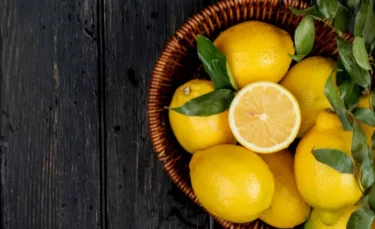
You can use lemon to improve your lip colour. It has been used for a long time in traditional practise. Studies3 have shown that lemon peel extracts can effectively stop melanin production. Lemon is rich in vitamin C and antioxidants. Due to its skin whitening, anti-inflammatory and antimicrobial properties, lemon extracts can help rejuvenate the skin and keep the skin glowing.
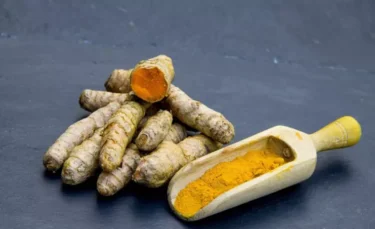
Excessive ultraviolet exposure can cause overproduction of melanin. In a study4 done in 2009, turmeric was found to prevent UV associated skin damage and lower skin inflammation as well as melanin production. These can help in reducing hyperpigmentation and keeping your skin healthy. Therefore, turmeric might help achieve pink lips.
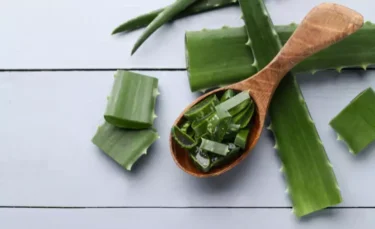
Aloe-vera is found to have skin-whitening effect by reducing melanin production. It may also help by forming a layer on the skin that avoids damage from UV rays. Moreover, aloe vera has healing, anti-inflammatory and moisturising properties also that are all great for the skin5. Therefore, applying aloe vera to the lips might be beneficial.
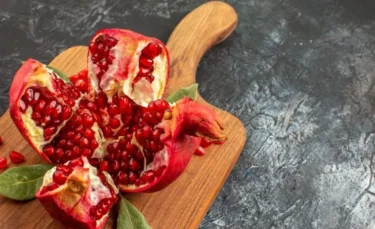
Pomegranate can be used as a potential skin-lightening agent. In an animal study, pomegranate extract was found to reduce skin pigmentation by preventing proliferation of melanocytes (cells containing melanin) and lowering melanin production6. Therefore, pomegranate might be beneficial for dark lips.
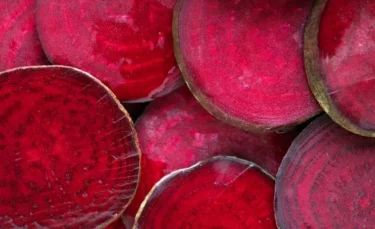
Beetroot contains vitamins A and C, nutrients like iron, and betanin (dye obtained from beetroot) that are responsible for its moisturising and colouring effect. Hence, beetroot infused balms might leave a natural pigment to the lips and can be used for giving a pink appearance to lips.
While studies7 have shown that these home remedies can reduce melanin production, further long-term human trials are needed to confirm if they can help reducing lip discoloration. Yet, trying them out in moderation can be a good option to lighten your lip colour naturally at home.
Eating lots of berries like bearberry (Arctostaphylos uva-ursi), blueberry, cranberry, and pear trees which contain arbutin which inhibits tyrosinase activity, an enzyme required for melanin production is very effective for lightening lips.
Dr. M.G. Kartheeka, MBBS, MD(Pediatrics)
You can seek medical help if you notice:
If home remedies don’t work for you or in case of above-mentioned conditions, do consult your doctor. They will help diagnose if an underlying condition or medicine is causing darkening of your lips. If so, they will treat the underlying cause, advise medicine alternatives or suggest cosmetic procedures that may help you get pink lips. More so, you will be assured that there’s nothing to worry.
Dr Ashish Bajaj, M.B.B.S, M.D. in Clinical Pharmacology and Toxicology
Also Read: Dark Lips: Causes, Home Remedies, Treatment & More
Generally, the lip skin has significantly less melanin as compared to the rest of the face. Discoloured or dark lips might be caused due to various reasons. Several home remedies like lemon, turmeric, aloe vera, etc., might be helpful for managing dark lips and attaining pink lips. Usually, dark lips are common, but if you feel that there is a persistent darkening of the skin and it is worrying you, or you notice any lesion that changes colour, size, and shape, you must seek medical help.
Also Read: Best Home Remedies For Dry Lips
There are a few home remedies for pink lips, including lemon, aloe vera, turmeric, beetroot, and pomegranate. Studies have shown that they have melanin blocking and antioxidant properties which might be helpful to get desired pink lips. However, consistency in use is important and results may vary based on individual factors.
Although dark lips are common, if you notice unexplained, persistent skin darkening, or any lesion that changes colour, size, and shape, then you must visit a doctor.
The lip skin has more blood vessels that appear through the skin due to very less melanin in the lip skin. This is the reason why the lips appear pink in colour1.
Yes, the sun can affect the colour of your lips. The sun’s UV rays reach the skin and cause more melanin production, which can further cause hyperpigmentation that might darken your lips.
Disclaimer: The information provided here is for educational/awareness purposes only and is not intended to be a substitute for medical treatment by a healthcare professional and should not be relied upon to diagnose or treat any medical condition. The reader should consult a registered medical practitioner to determine the appropriateness of the information and before consuming any medication. PharmEasy does not provide any guarantee or warranty (express or implied) regarding the accuracy, adequacy, completeness, legality, reliability or usefulness of the information; and disclaims any liability arising thereof.
Comments

Leave your comment...
You may also like
Comments